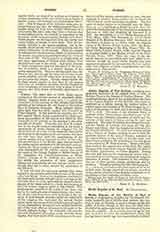

Clerks Regular of the Mother of God of Lucca, a congregation founded by the Blessed Giovanni Leonardi, son of middle-class parents, who was born in 1541 at Diecimo, a small township in the republic of Lucca, though at that time the chief place of a fief of the same name held by the bishops of Lucca from the republic. At seventeen years of age he was sent to Lucca to learn the apothecary’s trade, but having from a tender age been most piously inclined, he, after many difficulties, including the necessity of educating himself, embraced the sacerdotal state, and was ordained December 22, 1572. His congregation may be said to have begun in 1574. Two or three young laymen, attracted by his sanctity and the sweetness of his character, had gathered round him to submit themselves to his spiritual guidance and help him in the work for the reform of manners and the saving of souls which he had begun even as a layman. Giovanni rented the beautiful little church of Santa Maria della Rosa, and in a quarter close by, something like community life was started. It was here, when it became evident that Giovanni’s lay helpers were preparing for the priesthood and that something like a religious order was in process of formation, that a storm of persecution broke out against the devoted founder. The Fathers of the republic seem to have had a real fear that a native religious order, if spread over Italy, would cause the affairs of the little state to become too well known to its neighbors. The persecution, however, was so effective and lasting, that the Blessed Leonardi practically spent the rest of his life in banishment from Lucca, only being now and again admitted by special decree of the Senate, unwillingly extracted under papal pressure. In 1580 Giovanni acquired secretly the ancient church of Santa Maria Cortelandini (popularly known as Santa Maria Nera) which his sons hold to this day. In 1583 the congregation was canonically erected at the instigation of Pope Gregory XIII by Bishop Alessandro Guidiccioni, of Lucca, and confirmed by the Brief of Clement VIII “Ex quo divina majestas”, October 13, 1595.
The congregation at this time only took simple vows of chastity, perseverance, and obedience, and was known as the “Congregation of Clerks Secular of the Blessed Virgin”. In 1596 Clement VIII nominated the Blessed Giovanni commissary Apostolic for the reform of the monks of the Order of Monte Vergine, and in 1601 the cardinal protector appointed him to carry out a similar work among the Vallombrosans. In 1601 he obtained the church of S. Maria in Portico in Rome. In the same year Cardinal Baronius became protector of the congregation. Giovanni died in Rome October 9, 1609, aged sixty-eight, and was buried in Santa Maria in Portico. The present church of the congregation in Rome, obtained in 1662, is Santa Maria in Campitelli (called also Santa Maria in Portico) interesting to Englishmen as the first titular church of the Cardinal of York. The body of the founder was removed to this church and lies there under the altar of St. John the Baptist. Giovanni Leonardi was declared Venerable in 1701, and beatified by Pius IX in 1861. Leo XIII, in 1893, caused his name to be inserted in the Roman Martyrology and ordered the clergy of Rome to say his Mass and Office, an honor accorded to no other Blessed in that city except the beatified popes. In 1614 Paul V confided to the congregation the care of the so-called Pious Schools. It is in his Brief “Inter Pastoralis” that the congregation is first called “of the Mother of God“, having until then been known by its original name of “Clerks Secular of the Blessed Virgin”. The care of these schools being considered outside the scope of the congregation, it was relieved of their charge by the same pontiff in 1617.
It was not until 1621 (November 3) that Gregory XV, carrying out what was always in the founder’s mind, erected the congregation into a religious order proper by permitting its members to take solemn vows, and it henceforth became the Clerks Regular of the Mother of God. The Blessed Leonardi received many offers of churches during his life, but with a view of conciliating the governing body of the republic thought it better to refuse them. In all its history the order has never had more than fifteen churches, and never more than seven at one time. It was introduced into Naples in 1632, Genoa 1669, and Milan 1709. The only churches of the order now existing are Santa Maria Cortelandini, Lucca; Santa Maria in Campitelli, Rome; Santa Maria in Portico di Chiaja, and Santa Brigida, Naples; the Madonna della Stella Migliano (1902); and the parish church of S. Carlo in Monte Carlo (1873), the only church of the order outside the borders of modern Italy. In the sacristy of Santa Maria Cortelandini is preserved a large portion of a hair-shirt of St. Thomas of Canterbury whose feast is celebrated there with considerable ceremony; in 1908 half of this relic was presented to the Benedictine Abbey of St. Thomas, Erdington, England. The former residence of the clerks, who kept a large boys’ school until the suppression in 1867, is now the public library of Lucca. Two of the original companions of the holy founder, Cesare Franciotti and Giovanni Cioni, have been declared Venerable. The order justly enjoys great fame for its learning and its numerous scholars and writers. Suffice it to mention Giovanni Domenico Mansi, editor of the “Councils” and a hundred other works. The arms of the order are azure, Our Lady Assumed into Heaven; and its badge and seal the monogram of the Mother of God in Greek characters.
MONTGOMERY CARMICHAEL

